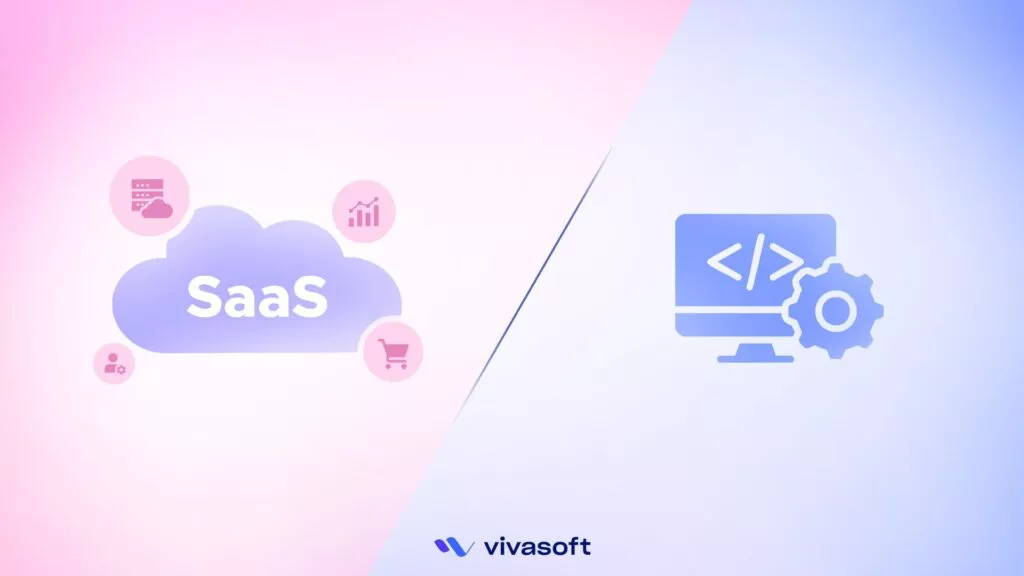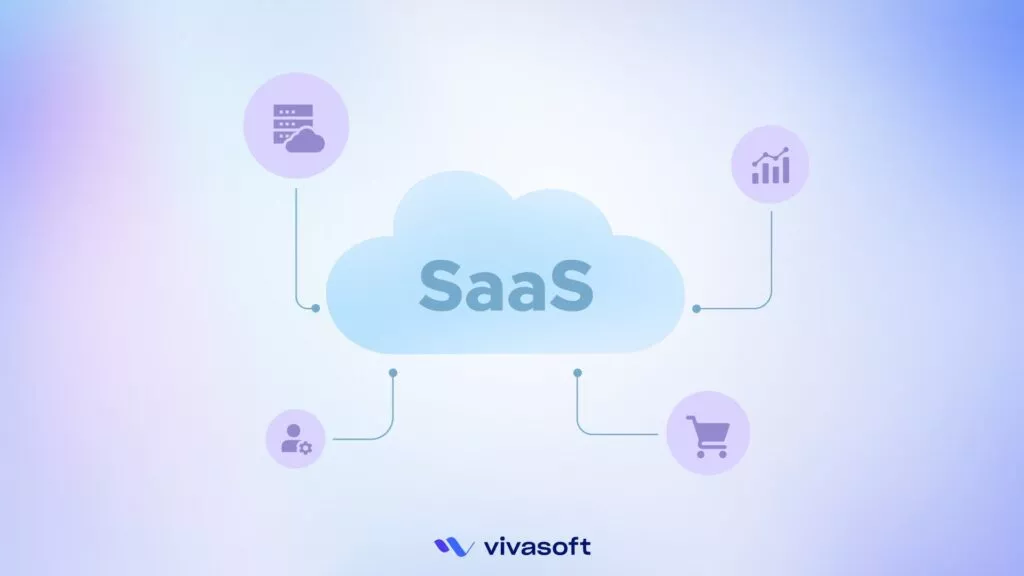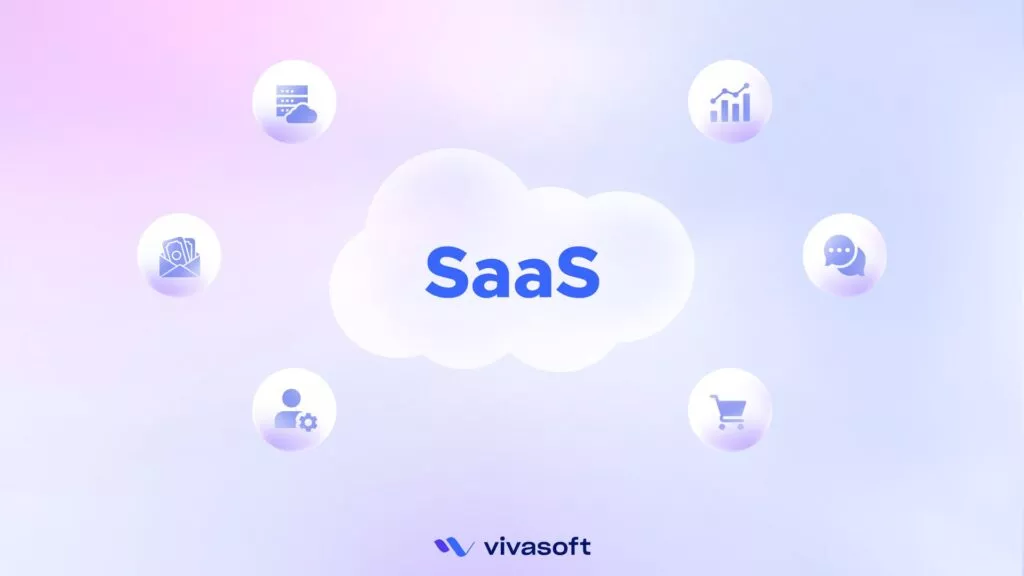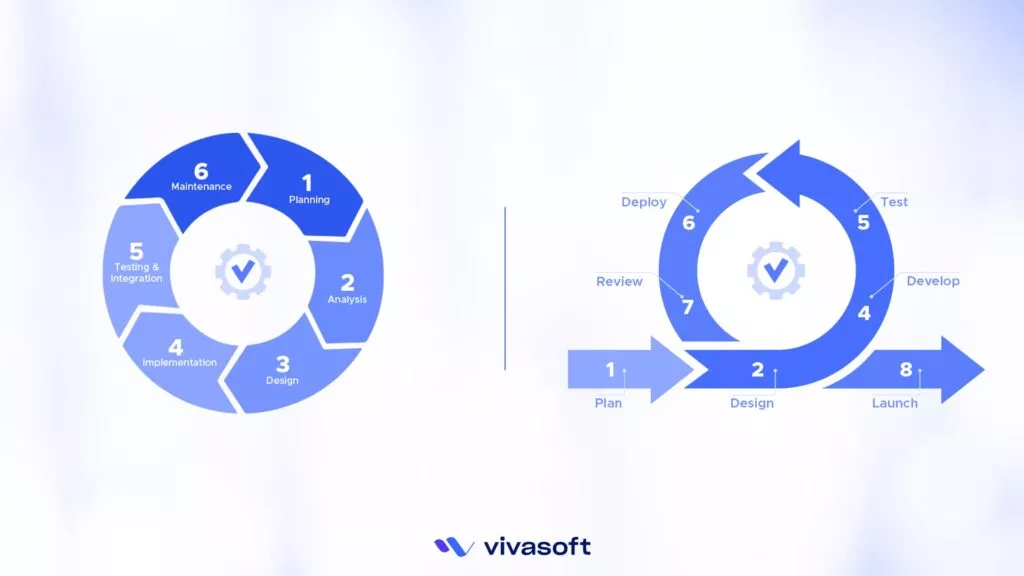B2B custom software development encompasses software development companies that build custom software for other businesses.
Custom software is crucial for your business because it can optimize sales, marketing, payroll, analysis, etc. There is more versatility with custom software, as well as an increase in scalability.
In this article, we will be covering everything you need to know about B2B custom software development. From its benefits and challenges to real-life case studies, we will cover everything you need to know. Keep reading to find out why we think Vivasoft Limited is one of the best companies for B2B custom software development.
Benefits of B2B Custom Software Development
Customized solutions and better competitive advantage are just some of the obvious advantages of B2B custom software development. In this section, we have analyzed some of the advantages of B2B custom software development.
1. Cost Efficiency
Off-the-shelf software may seem cheaper at first glance, but in the long term having B2B custom software is more cost-effective. You will have tailor-made software that doesn’t require monthly renewals, subscriptions, or updates, saving you a lot of money in the long term.
2. Scalability
When a company builds custom software for you, it’s built with scalability in mind. As your company grows, your needs will change and become more complex. Custom software is more flexible and can adapt to your company’s growing complexity.
3. Competitive Advantage
One of the most important features of B2B custom software is providing unique functionality specifically catered to your needs. This will set you apart from others in the business who opt for run-of-the-mill off-the-shelf software.
4. Improved Efficiency
Every company’s workflow is different. Custom software is specifically made keeping that workflow in mind, that general software will never be able to meet. Hence, there is improved productivity and efficiency with custom software.
5. Enhanced Data Security
Data breaches are quite common and extremely dangerous. To prevent such breaches, B2B custom software has more nuanced security layers. Off-the-shelf software is used by many businesses, whereas with your custom software, you can restrict access, thus enhancing security.
6. Integration Capabilities
Most companies need to run several programs simultaneously. B2B custom software is built in a way that integrates it within your existing system, hence you don’t need to adapt to a completely new infrastructure. This is beneficial because an entire system overhaul is not possible for software companies.
7. Tailored Solutions
B2B custom software is always tailor-made for your company’s specific needs. It’s optimized to your requirements and provides a better user experience for your customers. Each company has its niche requirements for software, and off-the-shelf software isn’t always catered to provide for such needs.
Factors in B2B Custom Software Development

How do you know if you need custom software for your company? What are the factors to consider in custom software development? In this section, we have analyzed the aforementioned factors.
Needs Assessment
First, you need to assess your requirements. Needs assessment is a systematic process that can help you determine the gaps in your own company. What are the current problems you are facing, and what kind of software is required to change those problems? This internal screening is the first step when factoring in whether you need B2B custom software or not.
Budget Planning
First, you need to assess your requirements. Needs assessment is a systematic process that can help you determine the gaps in your own company. What are the current problems you are facing, and what kind of software is required to change those problems? This internal screening is the first step when factoring in whether you need B2B custom software or not.
Vendor Selection
The vendor should have versatile tech experience, a strong portfolio, and good reviews and testimonials from previous customers. It’s important to also establish strong communication with your vendor.
Technology Stack
There are many possible technology stacks for software. Each has its own set of strengths and weaknesses. You should compare and evaluate the advantages and disadvantages of these stacks (LAMP, MEAN, MERN, etc) before deciding on one.
Security and Compliance
One of the most important aspects of B2B custom software development is data security. The vendor you are choosing needs to be well-versed in the best security practices, and you need to look into access control, risk assessment, and authentication.
The B2B Custom Software Development Process

B2B custom software development is the perfect example of end-to-end software development that’s customized for your needs. From conception to execution, you will work collaboratively with your vendor for your custom software.
1. Requirements Gathering
The vendor and your company will work collectively to understand user needs, your business requirements, etc. You also need to identify the project’s SMART goals and target groups.
2. Design and Planning
Your vendor will design and plan the software’s capabilities, operations, features, etc. There are also non-functional things like technical specifications, stability, and performance of the software.
3. Development
This is the stage where the software will start being developed by your vendor. This stage involves designing the code, developing existing features, and integrating the software with your existing systems.
4. Testing and Quality Assurance
Software testing ensures that the requirements you had for your custom software were met. At this stage, the software will be tested for any interface or communication errors between specific modules.
5. Deployment
At this stage, the software will be deployed in a production environment. The custom software will be installed, configured, and tested to make sure it can operate in the required environment.
6. User Acceptance Testing (UAT)
UAT is done by the client to ensure the software performs the way the client requires it. After UAT, the software is usually moved to the production environment.
7. Maintenance and Support
This is the process in the development cycle where the software is modified and updated according to user needs. This takes place after the software has been launched, and often bugs are fixed or the software is improved in this stage.
There are three important things to consider within the lifecycle of software development.
- Documentation
Software documentation is the text that describes what the software is supposed to do. This can be both written and illustrated and is usually accompanied by the software.
- Project Management
Project managers need to ensure the final software meets all client and customer requirements, while also working within constraints such as the budget and the timeline.
- Collaboration and Communication
There needs to be effective collaboration and communication between the vendor and the client for a successful product launch.
Industries and Use Cases
Many industries across the globe use B2B custom software. Let’s take a look at how custom software is used in different industries.
Healthcare
AI software solutions claim a substantial 40.5% in revenue share in healthcare. One of the pitfalls of the healthcare industry is data silos. Electronic Health Record Software (EHR), medical database software, and medical diagnoses software are some of the common custom software used in the healthcare industry.
Finance
Banks, financial advisors, and brokerages need custom software all the time in their respective fields. B2B custom software is a must in the finance industry. Starting from mobile banking to trading financial instruments, custom software development is a huge part of Fintech, which accounts for 5% of the global banking sector’s revenue.
Manufacturing
B2B custom software is useful in the manufacturing industry to manage their workforce, in light of recent global labor shortages. B2B custom software development helps to build software for manufacturing industries that can track attendance, income, and shift changes of workers.
E-commerce
B2B custom software development is crucial in E-commerce. From inventory tracking, and listing bulk product import, to generating invoices, having custom software that can be integrated within your system to manage your E-commerce business is crucial.
Logistics
The logistics industry is a huge part of the global economy. Having custom software is greatly beneficial for logistics companies for many reasons. From managing your documents to your supply chain (SCM) to having manufacturing execution systems (MES), your custom software will help your company function smoothly. The B2B software market for logistics is expected to rise by 4.6% by the year 2028.
Challenges and Pitfalls
There are challenges to everything, including B2B custom software development. We have analyzed some of the challenges and pitfalls of this phenomenon below.
1. Project Management
Ineffective project management can be a catastrophe when building custom software. Sometimes there are scheduling delays or a mismanagement of resources, which leads to the software not being completed within the given timeline.
2. Scope Creep
One fundamental truth about the tech industry is that it’s ever-changing and it’s growing at an exponential pace. To keep up with this, the scope of the software you’re building also changes. You may have communicated to your vendor about having three essential features of your software. However, within the timeline of building the software, your core features may increase according to your changing needs.
3. Data Migration
Transferring your data from your existing system into the new custom software can be difficult. Additionally, you may have to change your existing data into new formats or applications because of the custom software.
4. Integration
Integrating custom software with your existing team can be very difficult. Since the software is being built from scratch, it will have to be made to adapt with your existing systems in mind, so that there is no problem with integration.
5. Change Management
Change management (changing and managing artifacts) is crucial in the software development process. However, if not communicated effectively between all stakeholders, this can be a giant pitfall in the software development life cycle. Artifacts may need to change frequently if there is evolving scope creep, hence change management is an important challenge to overcome.
Facilitating Data-Driven Insights for Azerion through Technology Developed by Vivasoft
When Azerion, a behemoth in the digital gaming and monetization industry, faced a critical challenge, Vivasoft came through. Azerion needed help determining the number of unique users across its many platforms. This project required heaps of data: the compressed data reached an unfathomable 10-12TB.
Vivasoft implemented a cutting-edge technological solution. Through using Apache Spark, AWS Cloud Formation, AWS Glue, AWS data pipeline, and JetBrains TeamCity, they were able to create a flawless, operational data pipeline. This uninterrupted data pipeline was a perfect example of streamlined data pipeline execution.
By implementing Vivasoft’s solution, Azerion was able to identify unique users across its diverse platforms.
There were three distinct issues, and three sets of solutions provided by Vivasoft. Firstly, unique users needed to be identified and tracked. Vivasoft solved this by leveraging their expertise and establishing a robust data pipeline.
The pipeline used the aforementioned cutting-edge technology. As a result, Azerion was able to exponentially enhance the user experience. By identifying unique users, Azerion could optimize advertisements and personalize features accordingly.
Secondly, Vivasoft needed to handle the large data volumes of Azerion, which they executed smoothly. Vivasoft achieved this by integrating the aforementioned Apache Spark, AWS Cloud Formation, etc, which enhanced Azerion’s data-driven decision-making capacity. This helped Azerion come up with better strategies to make the customer experience more fulfilling.
Thirdly, Vivasoft worked closely with Azerion to come up with a customized data analytics framework, by using advanced tools and machine learning models. All of these helped Azerion understand user preferences better. Subsequently, this helped them make better data-driven decisions, and build better relationships with their user base.
Future Trends in B2B Custom Software Development
The constantly evolving world of tech is seeing some future trends, so let’s talk about the future trends in B2B custom software development.
Artificial Intelligence and Machine Learning: AI-driven tools helping software developers are the future. AI helps to generate codes, automate mundane tasks, and help with debugging the software.
Cloud Computing: Cloud computing has recently gained popularity in creating a virtual environment that helps with project management. Automated testing is also done with cloud computing.
Mobile Solutions: Software is being continuously developed so that you can manage your business from your tablet or phone easily. As we discussed before, this is used quite commonly in the finance industry, as is seen with mobile banking.
Internet of Things (IoT): The ultimate technology of the future, the Internet of Things allows devices with sensors to connect and exchange data with other devices without human interference. Using hardware and software solutions, IoT-oriented software can help maximize efficiency.
How to Get Started with B2B Custom Software Development
We’ve already covered some of the basics of opting for B2B custom software development in the earlier sections. You need to understand your requirements and then do market research on vendors who best fit those requirements. You also need to look into testimonials to ensure this company can be trusted.
You also need to have regular project kickoff meetings before the development process begins. This period is crucial in making sure all your requirements are being properly expressed to your vendor.
Some project management tips from experts would be: to constantly communicate with your team members, to get to know them properly, to prioritize time management, to identify risks, and most importantly, to use project management software.
If you’re looking for a company for your custom software, look no further than Vivasoft. We specialize in end-to-end software development and have over 7 years of experience with more than 75 successful projects completed.
We follow agile and scrum development methods, will use the best technology that will deliver the highest quality software, and can identify and fix bugs regularly.
Final Thoughts
In conclusion, we would highly encourage companies to opt into B2B custom software development. Not only will your software be built by experts in the field, but it’s also easier to scale, more efficient, and a wise financial investment. It’s perfect for integration as well.
Although there are certain challenges and pitfalls, in the ever-evolving tech world, these are issues that can be solved easily. If you are looking to work with a reliable vendor for your B2B custom software, make sure you look into Vivasoft.
Frequently Asked Questions (FAQ)
Here are some FAQs regarding B2B custom software development:
Yes. After your software is deployed onto the market, there may be incidents of bugs or glitches that need to be fixed. Hence, ongoing maintenance is necessary.
End-to-end custom software development ensures that the final software functions exactly according to the given requirements. From conception to execution, in end-to-end software development, the software is constantly monitored and updated.
You need to follow secure coding practices, and implement encryption schemes. The software should also have limited access to ensure no security breaches occur.
This depends on the features of your custom software. Different features have different associated costs.
You can use tools and methods to constantly monitor and update your software, hence if you need updates, those tools can help make sure the update happens accordingly.














